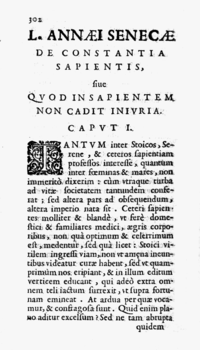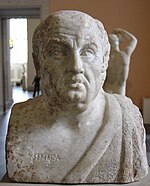De Constantia Sapientis
 From the 1643 edition, published by Francesco Baba | |
| Author | Lucius Annaeus Seneca |
|---|---|
| Country | Ancient Rome |
| Language | Latin |
| Subject | Ethics |
| Genre | Philosophy |
Publication date | AD c. 55 |
De Constantia Sapientis (transl. On the Firmness of the Wise) is a moral essay written by Seneca the Younger, a Roman Stoic philosopher, sometime around 55 AD. The work celebrates the imperturbility of the ideal Stoic sage, who with an inner firmness, is strengthened by injury and adversity.
Date and addressee[]
The work is addressed to Seneca's friend Annaeus Serenus and written sometime between 47 and 62.[1]
De Constantia Sapientis is one of a trio of dialogues addressed to Serenus, which also includes De Tranquillitate Animi and De Otio.[2] The superior position the sage inhabits, of detachment from earthly future events of a detrimental nature, is the unifying theme of the dialogues.[2] Since Serenus is portrayed as not yet a Stoic in De Constantia Sapientis, it is usually considered the earliest of the three dialogues.[3]
Content[]
In De Constantia Sapientis Seneca argues that Stoicism is not as harsh as it first appears. Recalling the figure of Cato the Younger Seneca argues that Cato as a wise person suffered neither injury nor insult. Although Serenus objects to this paradox, Seneca provides further analogies to emphasize the impervious nature of the wise person. In chapter 5 Seneca distinguishes between contumelia (insults) and iniuria (injuries). The rest of the treatise through to chapter 19 consists of discussions on the nature of both themes, showing that the wise person is immune from both insults and injuries. Seneca concludes the treatise praising the idea of the wise person while offering practical advice for all of us who are imperfect.[3]
References[]
- ^ Reynolds, L. D.; Griffin, M. T.; Fantham, E. (2012). Hornblower, S; Spawforth, A; Eidinow, E (eds.). The Oxford Classical Dictionary. Oxford University Press. ISBN 0199545561.
- ^ Jump up to: a b Gian Biagio Conte (4 Nov 1999). Latin Literature: A History. Translated by J Solodow. JHU Press. ISBN 0801862531.
- ^ Jump up to: a b Scott Smith, R. (2013). "De Constantia Sapientis". In Heil, Andreas; Damschen, Gregor (eds.). Brill's Companion to Seneca: Philosopher and Dramatist. BRILL. pp. 121–6. ISBN 9004217088.
Further reading[]
Translations[]
- Elaine Fantham, Harry M. Hine, James Ker, Gareth D. Williams (2014). Seneca: Hardship and Happiness. University of Chicago Press. ISBN 0226748332
External links[]
 Works related to On the Firmness of the Wise Man at Wikisource
Works related to On the Firmness of the Wise Man at Wikisource Latin Wikisource has original text related to this article: De constantia sapientis
Latin Wikisource has original text related to this article: De constantia sapientis- Seneca's Dialogues, translated by Aubrey Stewart at Standard Ebooks
- Philosophical works by Seneca the Younger
